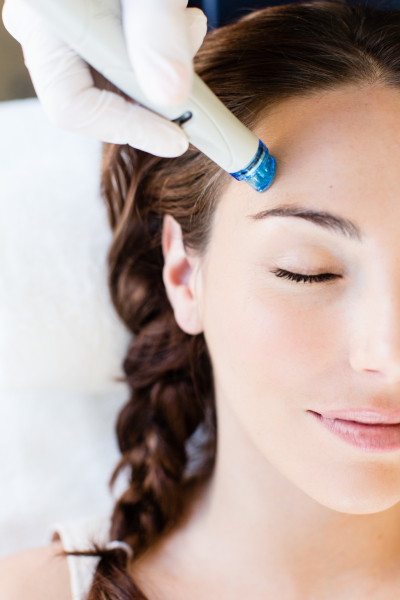CONTACT US
We would love to speak with you.
Feel free to reach out using the below details.
GET IN TOUCH
HOURS
- Mon-Thu 9:00AM - 5:00PM
- Friday 9:00AM - 12:00PM
Acne develops when there is an excess production of sebum, or oil in the skin, leading to pores becoming clogged, proliferation of bacteria and inflammation. This results in breakouts on the skin in the form of blackheads, whiteheads, pimples or cysts. Once a breakout clears, it can leave long-lasting spots on the skin such as discoloration or scarring.
Acne most often occurs on the face, chest or back and can affect people of all ages. Newborns may develop a form known as neonatal acne; teenagers undergoing hormonal changes of puberty are frequently faced with acne; athletes develop breakouts in areas of increased sweat or friction;
adult men and women can develop acne around the hairline from certain hair products clogging their pores; and young adult women may develop adult acne on the jawline and around the mouth for the first time, as a result of hormonal influences such as circulating androgens in the body.

In some people, acne can be exacerbated by dietary factors. Studies have shown that switching to a low glycemic index diet can reduce acne, while high glycemic index foods that cause spikes in blood sugar lead to worsening of acne.
When blood sugar spikes, there is an increase in inflammation throughout the body, as well as increased sebum (oil) production in the skin, both of which contribute to acne.
High glycemic index foods include white bread, potato chips, doughnuts and pastries. Low glycemic index foods include fresh fruits, oat bran, whole grains and non-starchy green vegetables. Dairy products, in particular cow’s milk, have also been shown to contribute to acne based on the theory that hormones in milk lead to inflammation in the body.
With the right skin care acne evaluation, acne treatment and care, virtually everyone can have clear skin. The proper treatment and acne regimen depends on the underlying cause of the breakouts, a person’s age, gender, skin type and unique complexion, and the type of acne lesions occurring. It’s important to treat acne in the early stages, before it leads to long-lasting scarring. Daily facial cleansing and use of non-comedogenic products forms the foundation for a skincare regimen. There are several topical over-the-counter and prescription medications which can be used in various combinations for long-term acne control. These include benzoyl peroxide, clindamycin, retinoids, salicylic acid, sulfur and dapsone. For more severe hormonal or cystic acne, oral (systemic) medications are often recommended, such as antibiotics, anti-androgens (including birth control pills and spironolactone) or isotretinoin.
For patients who are not candidates for systemic medications or who prefer alternative treatment options, chemical peels and Intense Pulsed Light (IPL) therapy are effective and safe modalities. Chemical peels are applied topically and can be customized with a blend of ingredients and different ranges of stren. Intense Pulsed Light penetrates into the hair follicle and targets the bacteria responsible for acne (P. acnes), thus reducing active inflammatory acne lesions.

We would love to speak with you.
Feel free to reach out using the below details.
2140 NE 26th Street Fort Lauderdale, FL 33305
Copyright © 2023 Cherise Mizrahi-Levi DO PA. All rights reserved.